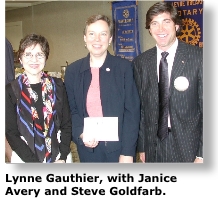|
|
||||||||||||||||||||||||||||
|
||||||||||||||||||||||||||||
|
||||||||||||||||||||||||||||
|
IN THIS ISSUE: |
||||||||||||||||||||||||||||
|
The Challenge of the Foster Child Duvall Rotary Club Announces Charter Celebration Ninth Annual Golf Outing on the Horizon Centennial Project Takes Shape Student of the Month: Gabrielle Hutter Curt Cummings Becomes Newest BBRC Member |
||||||||||||||||||||||||||||
|
The Challenge of the Foster Child
Madeline Gauthier, Community Service Committee Chair, introduced Janice Avery, Executive Director of TreeHouse, the organization the BBRC has supported for several year. Janice chose to speak not so much about TreeHouse — which helps foster kids to acquire some of the special things in life, like luggage, toiletries, and clothing.
Years ago, there began a movement that sensed that animals and children needed to be protected in their environment. This idea began to take shape about 1875, when a little girl named Mary Ellen was the center of an abuse case by her parents. The neighbors went to the police, but since there were no laws, they couldn’t do anything. The neighbors took the issue to the Society of Cruelty to Animals where Mary Ellen’s case was supported and under the laws of the day, prosecuted and was successful. During early child welfare programs there were things like ‘orphan trains,’ where they were transported to a new area and treated like indentured servants. This was part of an evolving, merging trend. Modern child welfare began in the 1960’s where the public became more aware of child sexual abuse. As doctors, nurses, and law enforcement got involved in abuse cases, the awareness grew. Federal law was established with emphasis on reuniting families. Making families work is not easy to do. We’re dealing with “whole generations of people who are not achieving well. They go from foster homes back to their own homes and back again. The major cause is drug and alcohol abuse by their parents.” Janice said, “It’s disappointing and discouraging that we haven’t been able to do more. Today only 20% of kids going into foster care go for sexual abuse reasons. Instead, there’s a trend of child neglect just plain non-support of their parents.” The Federal rules are changing impacting child welfare in the state. Foster kids that get back to their families within 90 days, seem to do okay. Beyond 90 days, kids are more likely to stay in Foster care ... even until they’re adults. The ongoing challenge is that many kids don’t have relationships with their parents. And matching kids with foster parents is a challenge. The kids are subjected to many placements over a lifetime. Underway now is a Federal review effort, looking at foster care. Washington is one of 40 states that has failed the review. Six months ago, a new supervisor was hired to create foster care reform in Washington State. There’s a lot of promise in the new plan. Janice asks, “So what can you do? Well, kids don’t vote. Something simple you could do is to call your Senator and Representatives and tell them you really care about kidsÉ.and foster kids in particular. Kids need connections with communities. We can all step up to help a kid in foster care. Take them to baseball games, get them clothing, etc. It takes a community to make a difference to these kids. Foster parents are heroes, says Jim Trombold from Mercer Island. Janice answers a question about how much foster parents receive. “It’s $275 a month for the youngest up to $450 for the oldest. The state offers a $100 clothing voucher once a year. There may be few who are working in foster care for the money. But, most are working from the heart.” Rotary clubs could adopt a Foster family. May is foster kid month. Janice believe that all kids are accounted for in the foster program in Washington. For the first time ever, a graduation ceremony will be held for kids leaving foster care. “We want to tell them what a good job they’ve done, despite the challenges. There are 300 kids in King County leaving foster care this year and about 100 are graduating from High School. We need to give them recognition for their achievement.” There are 11,000 kids in foster care in the state, 3,500 in King County. Everyone is invited to the TreeHouse Breakfast/Lunch on Wednesday, May 12. In closing, Madeline gave Janice a check for $2500 from the Community Service committee for use in the TreeHouse program. |
||||||||||||||||||||||||||||
 |
||||||||||||||||||||||||||||
|
CLICK HERE |
||||||||||||||||||||||||||||
 |
||||||||||||||||||||||||||||
|
Reveille | Reveille Archives | Meeting Information | Calendar | How to Join the BBRC | Officers & Directors | Committees | Online Member Directory | Short Directory PDF File | Directory Info Form | Set Up User Info | Forgot User Info | Meeting Make-Up Form | Attendance Statistics | Committee Roster | New Member Application (PDF File) | Expense-Funding Request Form (PDF File) | District 5030 Website & Newsletter | District 5030 Club Websites & Where-When They Meet | 2003 Raffle Winners | About the Raffle | Email Us
|
||||||||||||||||||||||||||||


